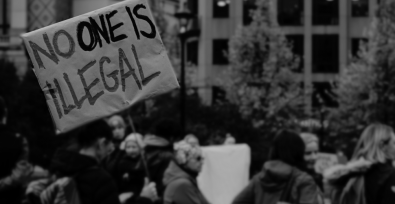Today, on International Migrants Day, I fear that the pervasive characterization of migration as a “legitimate concern”1 is driving both criminalization, and simultaneously, global indifference to the plight of people on the move, pushing more and more towards traffickers, where they face exploitation, abuse, and even death.
In 2024, we have witnessed governments weaponize narratives of sovereignty and security to both justify restrictive border policies and scapegoat migrants. When safe, legal migration routes and protection measures are not in place, traffickers exploit the desperation of those left without options, at worse trapping them in cycles of abuse and forced labor.
This is why safe migration policies are not just a humanitarian necessity but a critical tool in combating human trafficking. At Freedom United, we advocate for policies that uphold human dignity and protect people on the move from falling prey to trafficking.
The global situation is dire, and the media is saturated with headlines about tightening borders and hostile migration policies.
In Europe, governments are striking controversial deals with neighboring countries like Tunisia, Morocco, and Jordan to curb migration flows, often in exchange for financial aid, despite concerns over human rights abuses.2 The U.K. has come under scrutiny for its hardline approach, including detaining asylum seekers, including victims of modern slavery, and pausing applications for Syrians regardless of the ongoing risks of instability and persecution in Syria.3
At the same time, politicians continue to frame migrants as security threats or economic burdens, fueling violent attacks. Similarly, the E.U.’s external border policies, paired with violent pushbacks in the Mediterranean and Eastern Europe, have drawn condemnation from humanitarian organizations for exposing migrants to abuse, exploitation in detention centers, and denial of access to asylum procedures.4
Beyond Europe, hostile migration sentiments are reflected in North America and Australia, where rhetoric and policy increasingly prioritize deterrence over protection. In the U.S., intensified border enforcement and anti-immigration legislation have pushed migrants toward more dangerous routes, often with deadly consequences.5
Canada, despite its reputation for openness, faces criticism for restrictive measures at its southern border.6 While Australia continues its offshore detention practices, drawing international condemnation of the government’s policies relating to offshore processing and prolonged detention, allowing for the indefinite detention of asylum seekers.7
And that doesn’t even cover half of it. But there is a more innate danger: the risk of becoming desensitized to the immense human suffering behind these stories. With every new report of migrants drowning at sea, suffering abuse in detention centers, or falling victim to traffickers, we risk not only normalizing these horrors but also allowing modern slavery to tighten its grip on the most vulnerable.
If we continue down this path, 2025 may bring the same headlines, but we may no longer feel their weight, forgetting that migration is a shared human story to which most of us owe our existence.8
We must continue to shed light on the human cost of governmental decisions and hold leaders accountable for failures in their responsibilities to protect us all. Migration is not a threat to be contained but a testament to resilience and a pursuit of safety, freedom, and opportunity — values that should unite us, not divide us.
My hope for 2025 is a profound shift in how the world views migration—a year where migration is seen not as a problem to solve but as an opportunity to celebrate our shared humanity. Safe migration routes and progressive policies must become the standard, shielding people on the move from exploitation and dismantling the systems that allow trafficking to thrive.
Without this change, the tragedies that dominate today’s headlines will persist, and we risk forgetting the universal human right to safety, freedom, and the chance to pursue a brighter future.
If we do not act, the collective outrage that should demand justice could be replaced with apathy—a silence that traffickers and exploiters will exploit without hesitation.
By the next International Migrants Day, I hope we are telling stories not of despair but of dignity and progress, proving that our humanity is defined by compassion and action, not indifference.
[1] https://www.theguardian.com/commentisfree/article/2024/aug/13/immigration-immigrants-society-rich-labour-public
[2] https://www.hrw.org/news/2023/09/28/eu-commission-should-stop-ignoring-tunisias-abuses-against-migrants
[3] https://www.reuters.com/world/uk/uk-pauses-decisions-syrian-asylum-claims-bloomberg-reports-2024-12-09/
[4] https://www.europarl.europa.eu/RegData/etudes/BRIE/2022/738191/EPRS_BRI%282022%29738191_EN.pdf
[5] https://nnirr.org/programs/seeking-border-justice/stopping-migrant-deaths/
[6] https://www.migrationpolicy.org/article/us-canada-safe-third-country-agreement
[7] https://www.refugeecouncil.org.au/hrw-2017-report/
[8] https://www.bigissue.com/news/social-justice/migration-benefits-uk-facts/




